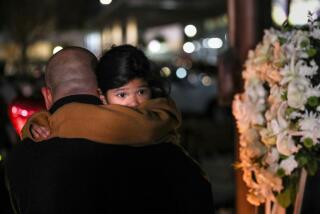How Your Child Can Push Back Bullies
- Share via
I was bullied in school and in the workplace, and have been the victim of domestic violence.
How can it be stopped? By not being a victim. Without a victim, there is no bully. How can I ensure my daughter is never a victim? How can parents raise self-empowered, positive kids?
The most important step is to demand proper treatment, and to do that you have to know your rights.
I spoke with a local law enforcement officer about victims’ rights in cases of schoolyard bullying. Initially it is up to the school whether or not to contact law enforcement. If you feel the school or parents have not handled the situation adequately, you can file assault or battery charges on behalf of your child. Depending on the severity of the offense, the bully could be remanded to a counseling program, community service or probation. Very rarely are bullies put into juvenile detention centers.
Bullying is not just a rite of passage; many adults carry the scars of bullying. It is imperative that both the bully and the victim be given mandatory counseling. If your child is resorting to aggression, there may be other problems that need to be dealt with. If your child is the victim, make sure that she understands the importance of standing up for herself. A victim left uncounseled can become depressed, self-hating, insecure and suicidal in severe cases. A bully left uncounseled can become an abusive spouse or co-worker or a criminal.
If your child is the victim of bullying, here is a checklist that will help you make sure the proper issues are handled.
* What was the exact situation; did it involve verbal abuse only?
* If it was verbal only, speak with the school counselor in person. Ask what measures were taken in regard to the bully (parents notified, etc.).
* Let your child know the outcome, and discuss her feelings.
* If you or your child feel the steps taken were not enough, request a meeting with the other child and the parents, with the counselor as a mediator. It is important for the victim to be able to confront the bully with a support system in place.
If the situation included physical assault, intimidation or threats of violence, the course of action should be slightly different.
* The school should contact you and apprise you of the situation immediately. Set up a meeting with the school counselor, the parents and the bully for the next day.
* Speak to your child before the meeting. If there was actual physical contact or threats of violence, be prepared to report it to the police.
* During the meeting, find out if the school has filed a police report. Ask the parents what they plan to do for punishment for this behavior. If you are not satisfied with their answer, be ready with what you think would be fair punishment, including mandatory counseling. If the parents balk, let them know that you will be filing a police report to ensure that there is proof of abuse.
* If you must file a complaint with the police, let your child do most of the talking. It is important for the child to be involved with this process. Ask the officer what will happen to the bully if there is a repeat incident.
* Find counseling for your child outside of the school to help him or her establish a positive self-image and learn boundary-setting, etc.
Do not take any case of bullying lightly. Every child should have the right to pursue an education without constant threats of physical and verbal abuse.
If your child is a bully and you do not get counseling for him, be prepared for worse behavior. If your child is using aggression, then you may be the next target. It is your duty as a parent to support, raise and love your children, but it is also your job to recognize that your child might be a bully or a victim and seek help.
Stacey L. Centorbi lives in Laguna Hills.






